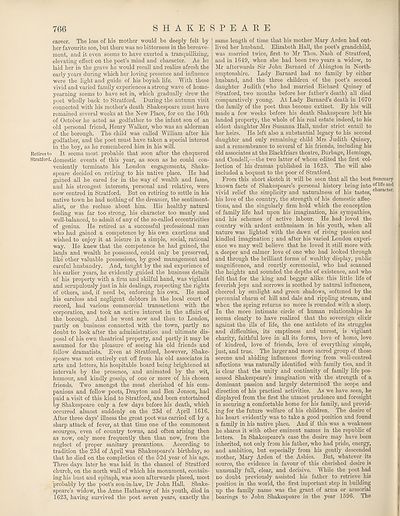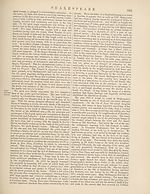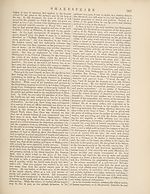Encyclopaedia Britannica > Volume 21, ROT-Siam
(776) Page 766
Download files
Complete book:
Individual page:
Thumbnail gallery: Grid view | List view

SHAKESPEARE
766
career. The loss of his mother would be deeply felt by
her favourite son, but there was no bitterness in the bereave¬
ment, and it even seems to have exerted a tranquillizing,
elevating effect on the poet’s mind and character. As he
laid her in the grave he would recall and realize afresh the
early years during which her loving presence and influence
were the light and guide of his boyish life. With these
vivid and varied family experiences a strong wave of home¬
yearning seems to have set in, which gradually drew the
poet wholly back to Stratford. During the autumn visit
connected with his mother’s death Shakespeare must have
remained several weeks at the New Place, for on the 16th
of October he acted as godfather to the infant son of an
old personal friend, Henry Walker, who was an alderman
of the borough. The child was called William after his
godfather, and the poet must have taken a special interest
in the boy, as he remembered him in his will.
Retires to It seems most probable that soon after the chequered
Stratford, domestic events of this year, as soon as he could con¬
veniently terminate his London engagements, Shake¬
speare decided on retiring to his native place. He had
gained all he cared for in the way of wealth and fame,
and his strongest interests, personal and relative, were
now centred in Stratford. But on retiring to settle in his
native town he had nothing of the dreamer, the sentiment¬
alist, or the recluse about him. His healthy natural
feeling was far too strong, his character too manly and
well-balanced, to admit of any of the so-called eccentricities
of genius. He retired as a successful professional man
who had gained a competence by his own exertions and
wished to enjoy it at leisure in a simple, social, rational
way. He knew that the competence he had gained, the
lands and wealth he possessed, could only be preserved,
like other valuable possessions, by good management and
careful husbandry. And, taught by the sad experience of
his earlier years, he evidently guided the business details
of his property with a firm and skilful hand, was vigilant
and scrupulously just in his dealings, respecting the rights
of others, and, if need be, enforcing his own. He sued
his careless and negligent debtors in the local court of
record, had various commercial transactions with the
corporation, and took an active interest in the affairs of
the borough. And he went now and then to London,
partly on business connected with the town, partly no
doubt to look after the administration and ultimate dis¬
posal of his own theatrical property, and partly it may be
assumed for the pleasure of seeing his old friends and
fellow dramatists. Even at Stratford, however, Shake¬
speare was not entirely cut off from his old associates in
arts and letters, his hospitable board being brightened at
intervals by the presence, and animated by the wit,
humour, and kindly gossip, of one or more of his chosen
friends. Two amongst the most cherished of his com¬
panions and fellow poets, Drayton and Ben Jonson, had
paid a visit of this kind to Stratford, and been entertained
by Shakespeare only a few days before his death, which
occurred almost suddenly on the 23d of April 1616.
After three days’ illness the great poet was carried off by a
sharp attack of fever, at that time one of the commonest
scourges, even of country towns, and often arising then
as now, only more frequently then than now, from the
neglect of proper sanitary precautions. According to
tradition the 23d of April was Shakespeare’s birthday, so
that he died on the completion of the 52d year of his age.
Three days later he was laid in the chancel of Stratford
church, on the north wall of which his monument, contain¬
ing his bust and epitaph, was soon afterwards placed, most
probably by the poet’s son-in-law, Dr John Hall. Shake¬
speare’s widow, the Anne Hathaway of his youth, died in
1623, having survived the poet seven years, exactly the
same length of time that his mother Mary Arden had out¬
lived her husband. Elizabeth Hall, the poet’s grandchild,
was married twice, first to Mr Thos. Nash of Stratford,
and in 1649, when she had been two years a widow, to
Mr afterwards Sir John Barnard of Abington in North¬
amptonshire. Lady Barnard had no family by either
husband, and the three children of the poet’s second
daughter Judith (who had married Richard Quiney of
Stratford, two months before her father’s death) all died
comparatively young. At Lady Barnard’s death in 1670
the family of the poet thus become extinct. By his will
made a few weeks before his death Shakespeare left his
landed property, the whole of his real estate indeed, to his
eldest daughter Mrs Susanna Hall, under strict entail to
her heirs. He left also a substantial legacy to his second
daughter and only remaining child Mrs Judith Quiney,
and a remembrance to several of his friends, including his
old associates at the Blackfriars theatre, Burbage, Heminge,
and Condell,—the two latter of whom edited the first col¬
lection of his dramas published in 1623. The will also
included a bequest to the poor of Stratford.
From this short sketch it will be seen that all the best Summary
known facts of Shakespeare’s personal history bring into °^llfe ail<1
vivid relief the simplicity and naturalness of his tastes, c iaiac 61'
his love of the country, the strength of his domestic affec¬
tions, and the singularly firm hold which the conception
of family life had upon his imagination, his sympathies,
and his schemes of active labour. He had loved the
country with ardent enthusiasm in his youth, when all
nature was lighted with the dawn of rising passion and
kindled imagination; and after his varied London experi¬
ence we may well believe that he loved it still more with
a deeper and calmer love of one who had looked through
and through the brilliant forms of wealthy display, public
magnificence, and courtly ceremonial, who had scanned
the heights and sounded the depths of existence, and who
felt that for the king and beggar alike this little life of
feverish joys and sorrows is soothed by natural influences,
cheered by sunlight and green shadows, softened by the
perennial charm of hill and dale and rippling stream, and
when the spring returns no more is rounded with a sleep.
In the more intimate circle of human relationships he
seems clearly to have realized that the sovereign elixir
against the ills of life, the one antidote of its struggles
and difficulties, its emptiness and unrest, is vigilant
charity, faithful love in all its forms, love of home, love
of kindred, love of friends, love of everything simple,
just, and true. The larger and more sacred group of those
serene and abiding influences flowing from well-centred
affections was naturally identified with family ties, and it
is clear that the unity and continuity of family life pos¬
sessed Shakespeare’s imagination with the strength of a
dominant passion and largely determined the scope and
direction of his practical activities. As we have seen, he
displayed from the first the utmost prudence and foresight
in securing a comfortable home for his family, and provid¬
ing for the future welfare of his children, The desire of
his heart evidently was to take a good position and found
a family in his native place. And if this was a weakness
he shares it with other eminent names in the republic of
letters. In Shakespeare’s case the desire may have been
inherited, not only from his father, who had pride, energy,
and ambition, but especially from his gently descended
mother, Mary Arden of the Asbies. But, whatever its
source, the evidence in favour of this cherished desire is
unusually full, clear, and dedsive. While the poet had
no doubt previously assisted his father to retrieve his
position in the world, the first important step in building
up the family name was the grant of arms or armorial
bearings to John Shakespeare in the year 1596. The
766
career. The loss of his mother would be deeply felt by
her favourite son, but there was no bitterness in the bereave¬
ment, and it even seems to have exerted a tranquillizing,
elevating effect on the poet’s mind and character. As he
laid her in the grave he would recall and realize afresh the
early years during which her loving presence and influence
were the light and guide of his boyish life. With these
vivid and varied family experiences a strong wave of home¬
yearning seems to have set in, which gradually drew the
poet wholly back to Stratford. During the autumn visit
connected with his mother’s death Shakespeare must have
remained several weeks at the New Place, for on the 16th
of October he acted as godfather to the infant son of an
old personal friend, Henry Walker, who was an alderman
of the borough. The child was called William after his
godfather, and the poet must have taken a special interest
in the boy, as he remembered him in his will.
Retires to It seems most probable that soon after the chequered
Stratford, domestic events of this year, as soon as he could con¬
veniently terminate his London engagements, Shake¬
speare decided on retiring to his native place. He had
gained all he cared for in the way of wealth and fame,
and his strongest interests, personal and relative, were
now centred in Stratford. But on retiring to settle in his
native town he had nothing of the dreamer, the sentiment¬
alist, or the recluse about him. His healthy natural
feeling was far too strong, his character too manly and
well-balanced, to admit of any of the so-called eccentricities
of genius. He retired as a successful professional man
who had gained a competence by his own exertions and
wished to enjoy it at leisure in a simple, social, rational
way. He knew that the competence he had gained, the
lands and wealth he possessed, could only be preserved,
like other valuable possessions, by good management and
careful husbandry. And, taught by the sad experience of
his earlier years, he evidently guided the business details
of his property with a firm and skilful hand, was vigilant
and scrupulously just in his dealings, respecting the rights
of others, and, if need be, enforcing his own. He sued
his careless and negligent debtors in the local court of
record, had various commercial transactions with the
corporation, and took an active interest in the affairs of
the borough. And he went now and then to London,
partly on business connected with the town, partly no
doubt to look after the administration and ultimate dis¬
posal of his own theatrical property, and partly it may be
assumed for the pleasure of seeing his old friends and
fellow dramatists. Even at Stratford, however, Shake¬
speare was not entirely cut off from his old associates in
arts and letters, his hospitable board being brightened at
intervals by the presence, and animated by the wit,
humour, and kindly gossip, of one or more of his chosen
friends. Two amongst the most cherished of his com¬
panions and fellow poets, Drayton and Ben Jonson, had
paid a visit of this kind to Stratford, and been entertained
by Shakespeare only a few days before his death, which
occurred almost suddenly on the 23d of April 1616.
After three days’ illness the great poet was carried off by a
sharp attack of fever, at that time one of the commonest
scourges, even of country towns, and often arising then
as now, only more frequently then than now, from the
neglect of proper sanitary precautions. According to
tradition the 23d of April was Shakespeare’s birthday, so
that he died on the completion of the 52d year of his age.
Three days later he was laid in the chancel of Stratford
church, on the north wall of which his monument, contain¬
ing his bust and epitaph, was soon afterwards placed, most
probably by the poet’s son-in-law, Dr John Hall. Shake¬
speare’s widow, the Anne Hathaway of his youth, died in
1623, having survived the poet seven years, exactly the
same length of time that his mother Mary Arden had out¬
lived her husband. Elizabeth Hall, the poet’s grandchild,
was married twice, first to Mr Thos. Nash of Stratford,
and in 1649, when she had been two years a widow, to
Mr afterwards Sir John Barnard of Abington in North¬
amptonshire. Lady Barnard had no family by either
husband, and the three children of the poet’s second
daughter Judith (who had married Richard Quiney of
Stratford, two months before her father’s death) all died
comparatively young. At Lady Barnard’s death in 1670
the family of the poet thus become extinct. By his will
made a few weeks before his death Shakespeare left his
landed property, the whole of his real estate indeed, to his
eldest daughter Mrs Susanna Hall, under strict entail to
her heirs. He left also a substantial legacy to his second
daughter and only remaining child Mrs Judith Quiney,
and a remembrance to several of his friends, including his
old associates at the Blackfriars theatre, Burbage, Heminge,
and Condell,—the two latter of whom edited the first col¬
lection of his dramas published in 1623. The will also
included a bequest to the poor of Stratford.
From this short sketch it will be seen that all the best Summary
known facts of Shakespeare’s personal history bring into °^llfe ail<1
vivid relief the simplicity and naturalness of his tastes, c iaiac 61'
his love of the country, the strength of his domestic affec¬
tions, and the singularly firm hold which the conception
of family life had upon his imagination, his sympathies,
and his schemes of active labour. He had loved the
country with ardent enthusiasm in his youth, when all
nature was lighted with the dawn of rising passion and
kindled imagination; and after his varied London experi¬
ence we may well believe that he loved it still more with
a deeper and calmer love of one who had looked through
and through the brilliant forms of wealthy display, public
magnificence, and courtly ceremonial, who had scanned
the heights and sounded the depths of existence, and who
felt that for the king and beggar alike this little life of
feverish joys and sorrows is soothed by natural influences,
cheered by sunlight and green shadows, softened by the
perennial charm of hill and dale and rippling stream, and
when the spring returns no more is rounded with a sleep.
In the more intimate circle of human relationships he
seems clearly to have realized that the sovereign elixir
against the ills of life, the one antidote of its struggles
and difficulties, its emptiness and unrest, is vigilant
charity, faithful love in all its forms, love of home, love
of kindred, love of friends, love of everything simple,
just, and true. The larger and more sacred group of those
serene and abiding influences flowing from well-centred
affections was naturally identified with family ties, and it
is clear that the unity and continuity of family life pos¬
sessed Shakespeare’s imagination with the strength of a
dominant passion and largely determined the scope and
direction of his practical activities. As we have seen, he
displayed from the first the utmost prudence and foresight
in securing a comfortable home for his family, and provid¬
ing for the future welfare of his children, The desire of
his heart evidently was to take a good position and found
a family in his native place. And if this was a weakness
he shares it with other eminent names in the republic of
letters. In Shakespeare’s case the desire may have been
inherited, not only from his father, who had pride, energy,
and ambition, but especially from his gently descended
mother, Mary Arden of the Asbies. But, whatever its
source, the evidence in favour of this cherished desire is
unusually full, clear, and dedsive. While the poet had
no doubt previously assisted his father to retrieve his
position in the world, the first important step in building
up the family name was the grant of arms or armorial
bearings to John Shakespeare in the year 1596. The
Set display mode to:
![]() Universal Viewer |
Universal Viewer | ![]() Mirador |
Large image | Transcription
Mirador |
Large image | Transcription
Images and transcriptions on this page, including medium image downloads, may be used under the Creative Commons Attribution 4.0 International Licence unless otherwise stated. ![]()
| Encyclopaedia Britannica > Encyclopaedia Britannica > Volume 21, ROT-Siam > (776) Page 766 |
|---|
| Permanent URL | https://digital.nls.uk/193637367 |
|---|
| Attribution and copyright: |
|
|---|---|
| Shelfmark | EB.17 |
|---|---|
| Description | Ten editions of 'Encyclopaedia Britannica', issued from 1768-1903, in 231 volumes. Originally issued in 100 weekly parts (3 volumes) between 1768 and 1771 by publishers: Colin Macfarquhar and Andrew Bell (Edinburgh); editor: William Smellie: engraver: Andrew Bell. Expanded editions in the 19th century featured more volumes and contributions from leading experts in their fields. Managed and published in Edinburgh up to the 9th edition (25 volumes, from 1875-1889); the 10th edition (1902-1903) re-issued the 9th edition, with 11 supplementary volumes. |
|---|---|
| Additional NLS resources: |
|

